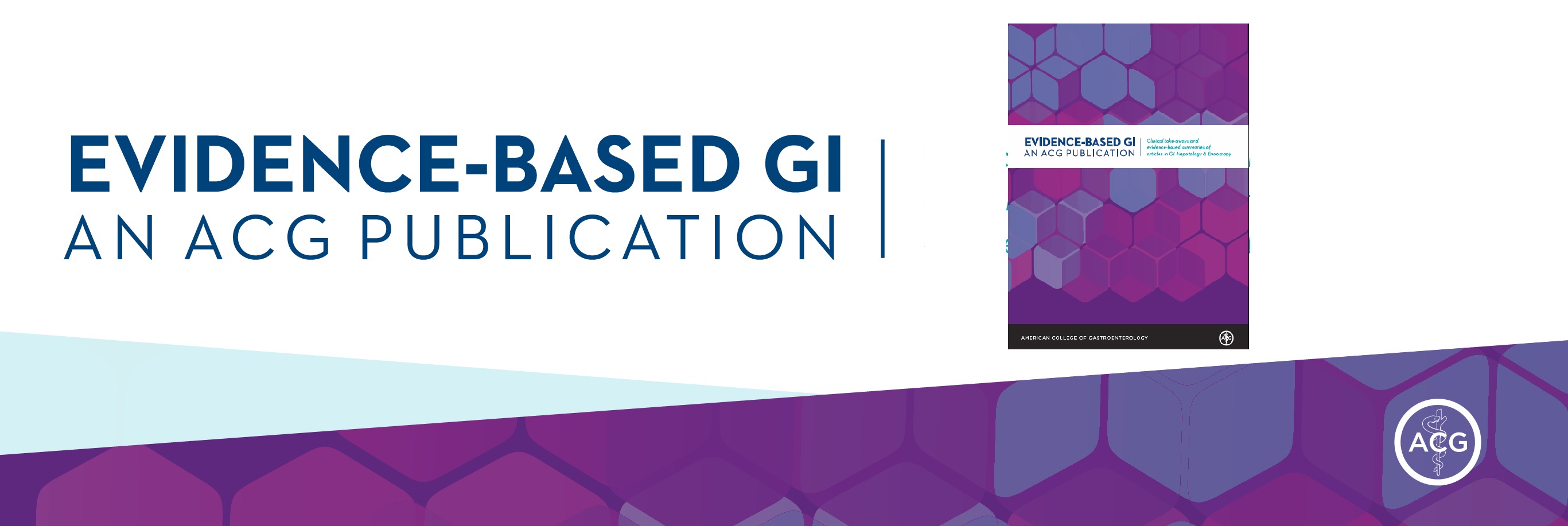Evidence-Based GI: An Introduction
Philip Schoenfeld, MD, MSEd, MScEpi, FACG
Editor-in-Chief
Gastroenterology Section, John R. Dingell VA Medical Center, Detroit, Michigan
Email: evidence.based.gi@gmail.com
Welcome to the first issue of Evidence-Based GI: An ACG Publication. Our goal is straightforward: to provide structured abstracts on the best clinical GI, hepatology, and endoscopy research published in US- and non-US-based general medicine journals using evidence-based methods. Each abstract will be paired with editorial commentary on how physicians can apply this research to their practice. We hope to further the educational mission of the American College of Gastroenterology (ACG) to deliver compassionate evidence-based GI patient care of the highest quality.
Even though I diligently review The American Journal of Gastroenterology, Gastroenterology, Gastrointestinal Endoscopy, and Clinical Gastroenterology and Hepatology each month, my GI fellows regularly find a way to humble me. It’s a little embarrassing to teach that a family history of gastric cancer may be a good indication to test for Helicobacter pylori, only to have a GI fellow inform me of a recent randomized controlled trial in The New England Journal of Medicine which found that H. pylori treatment in those patients reduced the incidence of gastric cancer significantly.1 It is another reminder that some of the best clinical GI research is frequently published in top general medicine journals.
In Evidence-Based GI, the content will review outstanding clinical GI research published in general medical journals, such as The New England Journal of Medicine, Annals of Internal Medicine, JAMA, and Lancet. It will also examine vital research published in the journals of European GI Societies, specifically GUT, Endoscopy, and the Journal of Hepatology. As an ACG publication, we will examine articles from our flagship Red Journal to summarize interesting research studies each issue. While many ACG members already subscribe to other journals published by US-based GI societies, our aim is to bring our readers’ attention to GI and hepatology studies coming from journals ACG members may not subscribe to in order for members to stay up-to-date on current research and trends. Of course, we will occasionally summarize research published in US-based society journals when groundbreaking work or applicable to clinical practice are featured.
Our Associate Editors have advanced degrees in clinical epidemiology or public health, and we are advocates of evidence-based medicine (EBM). We will apply EBM methodology to identify well-designed studies which minimize bias in order to produce accurate results. Then, we will explain study results in easy-to-use terms to facilitate the application to patient care and the study limitations. It is important to remember that “EBM” could also be used to describe “experience-based medicine,” and that no single study provides definitive data about how to treat each unique patient. For this reason, each commentary will include a “My Practice” section where the author will discuss how they combine the research data and their own experience when treating individual patients.
I am indebted to several mentors for inspiring this work. R. Brian Haynes, MD, PhD, is Professor (Emeritus) and Past Chair of the Department of Clinical Epidemiology at McMaster University in Hamilton, Ontario, and the inaugural Editor (and present Co-Editor) of the American College of Physicians (ACP) Journal Club publication—now a section in the Annals of Internal Medicine. He extended an invitation to me to write commentaries for that journal after an EBM seminar in the 1990s which started my academic career. In some ways, this publication is an homage to the ACP Journal Club, which I see as the gold standard for producing evidence-based summaries of clinical research. Also, Gordon Guyatt, MD, MSc, who coined the phrase “Evidence-Based Medicine,” and Deborah Cook, MD, MSc, are the true pioneers of EBM and spent countless hours teaching me EBM concepts. As this publication evolves, I will do my best to apply their lessons and teachings. Finally, Douglas Rex, MD, MACG, and past president of the ACG roused me from my COVID lockdown-induced stupor when he started ASGE JournalScan, which reviews endoscopic research. It is a terrific tool for endoscopists to identify studies that they may have missed. Although Evidence-Based GI has different aims and objectives, I would be remiss if I did not acknowledge how Dr. Rex’s work inspired me to work on this project. Finally, thanks to Deepak Parakkal, MD, FACG, Chair of the ACG Digital Communications and Publications Committee, and the current ACG President, David Greenwald, MD, FACG, for supporting this project as well as Anne-Louise Oliphant, ACG Vice President of Communications, Claire Neumann, ACG Managing Editor, Kavitha Gnanasekhar, ACG Assistant Managing Editor, and Kate Langenberg, the ACG Editorial Coordinator for making this project work.
This is a work in progress, and although the format, content, and presentation of the publication may change over time, our mission will remain the same. We are trying different approaches, including audio summaries that accompany each article. Each summary should be easily read in 5 minutes on one’s electronic device, and we are experimenting with graphical displays of key study findings. A glossary with definitions of different methodological and statistical terms will be added along with links to EBM guides for evaluating the medical literature. I welcome comments and thank you for joining us on this journey.
Reference
Choi IJ, Kim CG, Lee JY, et al. Family History of Gastric Cancer and Helicobacter Pylori Treatment. N Engl J Med 2020; 382: 427-36.
View the October 2021 Full Issue



